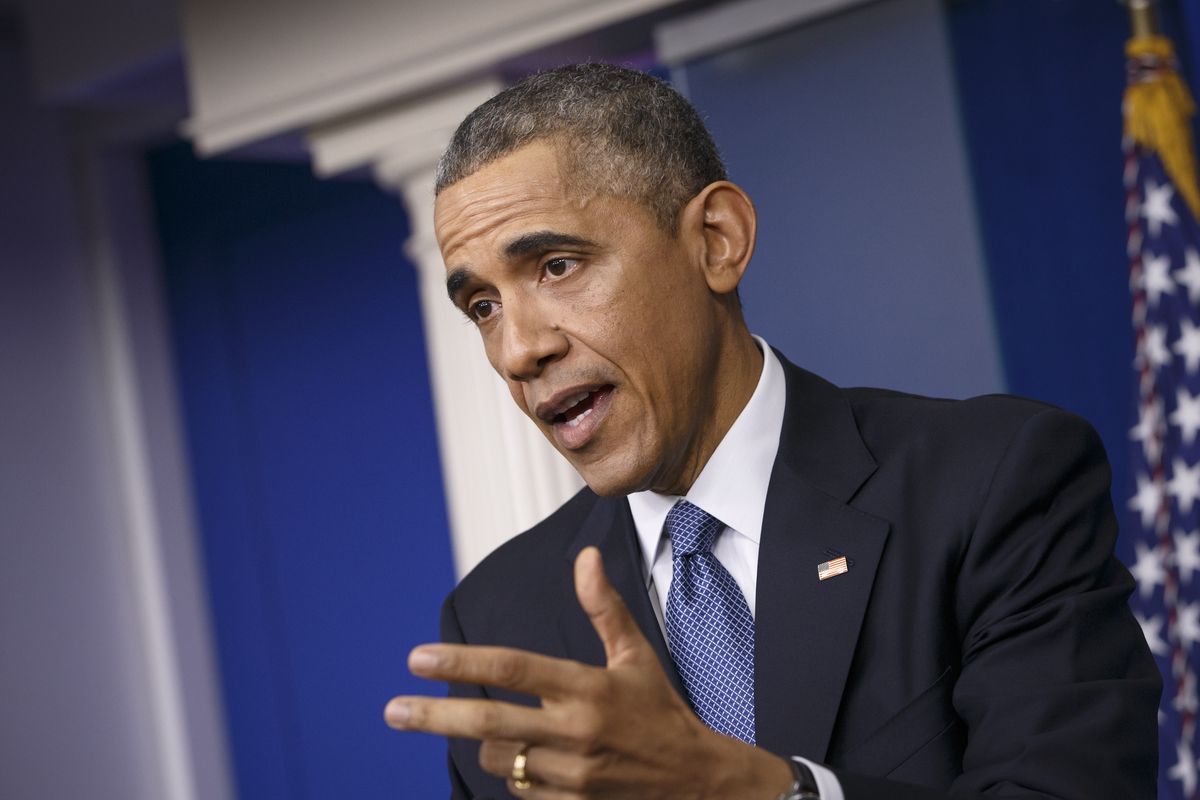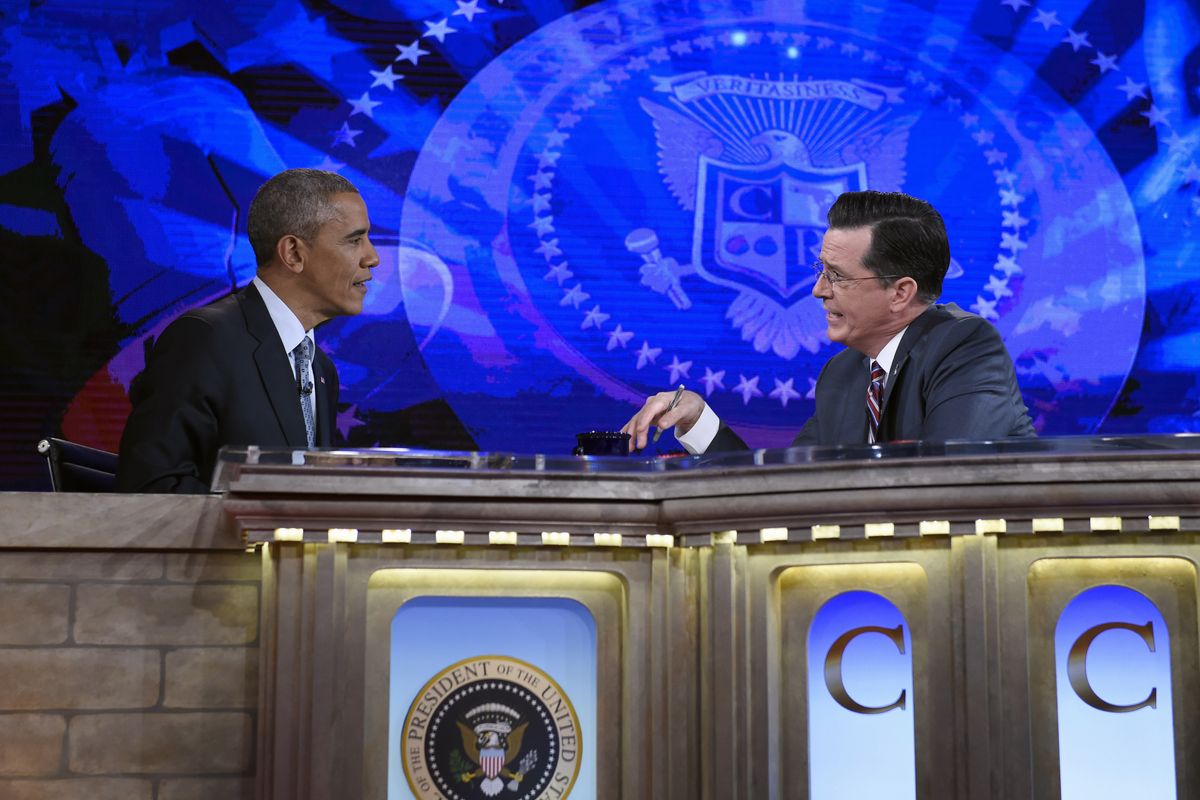Obama isn’t leaving quietly
Former aide says lame-duck status ‘liberated’ president
Obama’s presidency still is driven by high ambitions, but his power to achieve them is running out. (Associated Press)
WASHINGTON – It was supposed to be a joke. “Are you still president?” comedian Stephen Colbert asked Barack Obama earlier this month.
But the question seemed to speak to growing weariness with the president and skepticism that anything will change in Washington during his final two years in office. Democrats already are checking out Obama’s potential successors. Emboldened Republicans are trying to push aside his agenda in favor of their own.
At times this year, Obama seemed ready to move on as well. He rebelled against the White House security “bubble,” telling his Secret Service detail to give him more space. He chafed at being sidelined by his party during midterm elections and having to adjust his agenda to fit the political interests of vulnerable Democrats, who lost anyway.
Yet the election that was a disaster for the president’s party may have had a rejuvenating effect on Obama. The morning after the midterms, Obama told senior aides, “If I see you moping, you will answer to me.”
People close to Obama say he is energized at not having to worry about helping – or hurting – Democrats in another congressional election on his watch. He has become more comfortable with his executive powers, moving unilaterally on immigration, Internet neutrality and climate change in the past two months. And he sees legacy-building opportunities on the international stage, from an elusive nuclear deal with Iran to normalizing relations with Cuba after a half-century freeze.
“He gained some clarity for the next two years that is liberating,” said Jay Carney, Obama’s former press secretary.
Still, pillars of Obama’s second-term agenda – gun control, raising the federal minimum wage, universal pre-school – seem destined to stand unfulfilled. Wrapping up the Iraq and Afghanistan wars isn’t turning out to be nearly the tidy success story Obama once envisioned. Even supporters say one of the president’s top remaining priorities may have to be simply preventing Republicans from dismantling his earlier accomplishments, including the health care law.
The Yes-We-Can man is entering a twilight of maybes, his presidency still driven by high ambitions but his power to achieve them running out.
Before the midterm election results arrived, Obama’s advisers say, the president realized he would finish his presidency with Republicans running Capitol Hill. He concluded the status quo would mean more gridlock.
Indeed, 2014 had been another year of fits and starts for a White House that has struggled to find its footing in Obama’s second term.
The feeble HealthCare.gov website stabilized, but scandal enveloped the Department of Veterans Affairs. Syria got rid of its chemical weapons, but a violent extremist group pulled the U.S. back into military conflict in the Middle East. The unemployment rate fell, but so did Obama’s approval ratings – to the lowest levels of his presidency.
Nearly two dozen White House officials, former Obama aides, presidential historians and political analysts discussed Obama’s standing as he closes his sixth year in office, some on the condition of anonymity because they were not authorized to publicly discuss their conversations with the president or his top advisers.
For much of the year, Obama appeared to struggle with the realization that his political standing had slipped.
He publicly complained about criticism of his foreign policy by pundits in Washington and New York. Despite pleas from his party to stay out of November’s elections, he said his policies were indeed on the ballot. He desperately looked for ways to break free of the confines of the White House.
Obama is realistically optimistic about what he can get done over the next two years, advisers say. He wants to try tax reform and sees opportunities to accelerate growth and job creation with the economy on firmer footing. Aides have reached out to historians and political scientists to solicit ideas for Obama’s next State of the Union address.
Yet the president is forging ahead as something of an isolated figure. Congressional Democrats are increasingly willing to go against him. And in the West Wing, Obama’s tight inner circle of loyal advisers keeps shrinking.
The trio of political gurus who helped direct his presidential campaigns – David Axelrod, Robert Gibbs and David Plouffe – have moved on. And former chief of staff Rahm Emanuel is now the mayor of Chicago. Other longtime aides are eyeing exits. Bringing in fresh talent is getting harder.
Obama is trying to branch out. He started keeping his version of a bucket list: the names of authors, business leaders, innovators and others he wants to bring to the White House for a private lunch or dinner. Those who have visited include inventor and business tycoon Elon Musk, historian Doris Kearns Goodwin and AT&T CEO Randall Stephenson, a major Republican donor.
Signs that Obama’s presidency is closing are all around.
Within weeks, the race to replace him will begin in earnest. Democrats are lining up to endorse Hillary Rodham Clinton, though she’s yet to declare her candidacy.
People close to Obama say he is weighing what he’ll do when he leaves the White House. He is studying the paths predecessors have taken and has expressed interest in both domestic and international issues.
He is already imagining life with fewer restrictions.
Asked in a New Yorker interview earlier this year whether he would want to be a judge, Obama said that sounded a bit “too monastic.”
“Particularly after having spent six years and what will be eight years in this bubble, I think I need to get outside a little bit more.”

